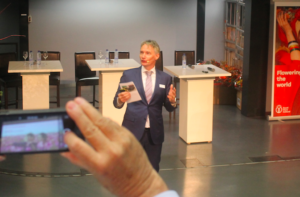According to Jan Rotmans, professor in transition management, our economy, including the floricultural industry, is facing the biggest challenge in 100 years. A digital revolution is turning the sector upside down. Lucas Vos feels that blockchain and 3D printed flowers are a step too far. “But yes, the industry and FloraHolland will have to make some drastic changes indeed.”
The industrial revolution didn’t just change the economy, but also the society of the 19th century. What’s going on at the moment, is also a revolution: a digital one. And this revolution will also change economy and society. This is what Jan Rotmans said at the first World Floral Summit in Aalsmeer. The event was organised by several international organisations from the floricultural industry: FloraHolland, Union Fleurs, AIPH, FleuroSelect, Florint and Ciopora.
House printing
Rotmans listed four characteristics of the new economy. Firstly, it’s no longer just about money, but also about how companies contribute to society. An example? Tesla doesn’t just want to make money, they also want to solve the energy problem. Secondly, it’s about digitalisation. Google, Uber, Airbnb, Spotify. Everything is internet based nowadays. Thirdly, big data makes it possible to offer consumers highly personalised products. And finally, the 3D printer is going to have a huge impact. In Shanghai, they’re already printing ten houses a day. According to Rotmans, the idea of a passive consumer will no longer exist in the future.

What does the digital revolution mean for the floricultural industry? Rotmans thinks that blockchain will definitely change the logistical aspect of the floricultural industry. It’s some sort of digital accounting system, for which all sorts of data are shared. Rotmans referred to it as the biggest disruption in the sector. To make change, Rotmans said, you need people from outside the sector. And the world is asking for sustainable options more and more.
Drastic change
Lucas Vos, CEO of FloraHolland, could agree with Rotmans’ ideas to a large extent. But he doesn’t believe that blockchain is going to play a role. He has more faith in improving the current supply chain. And he doesn’t fear any competition from 3D printed flowers. “At the end of the day, consumers still want a natural product. But yes, we’ll have to make some drastic changes indeed. Everyone is stuck in their own thinking, that goes for FloraHolland too”, said Vos.

The auction has already embraced the idea of sustainability. By 2020, 90% of their supply has to be ‘FSI-proof’. Vos feels, just like Rotmans, that it’s important to attract people from outside the industry to help it move forward. Under the management of Vos, FloraHolland’s top 50 has seen quite a few changes; 36 employees were replaced, mostly by people from other industries. Vos also agreed that the consumer is going to play a leading role in the future, rather than growers or FloraHolland customers. Furthermore, new consumer markets are emerging in Asia and the Middle East. And the logistics chain isn’t ready for it.
Smaller orders
If consumers are indeed taking the lead, the floricultural chain is going to be a demand driven chain. Vos pointed out that: “We’re not organised for a demand driven chain. At this very moment, we can already see that plant and flower orders are getting smaller and smaller and that FloraHolland customers are no longer keeping any stock. The auction doesn’t have an answer to that.”
The result is an inefficient supply chain and there’s an impact on the cold chain, too. We are not investing in logistics and the cold chain. Trolleys and containers aren’t tagged. Vos: “All our trolleys are silent, we don’t know where they are. We don’t know where our containers are either, nor how much water they are filled with and what the temperature of that water is. Heavy investments from our side as well as the customers’ side, are needed. After that, we can start saving on logistics costs.”
Physical clock
Something else that gets in the way of efficient logistics according to Vos, are the physical clock sales. “I’m not saying we should get rid of the clock, but the fact that the transaction moment is connected to the logistic delivery of plants and flowers is an obstacle for efficient logistics. We’ve got to change this very soon.” It’s a well-known fact that Vos thinks digitalisation is important. FloraHolland has launched a digital platform, Floriday, and they’re currently experimenting with the Today for Tomorrow auctioning system.
Other digital platforms have been popping up, too. Vos said he’s got mixed feelings about this. “I’m not worried about competition within our sector. But I do worry about a large party getting involved. Like some sort of Amazon. They will swallow us up.”
Marco van Zijverden, CEO of Dutch Flower Group, reassured Vos with regards to competition within the industry. “We are completely open to the idea of a collaboration between Floriday and Blue Roots.”









